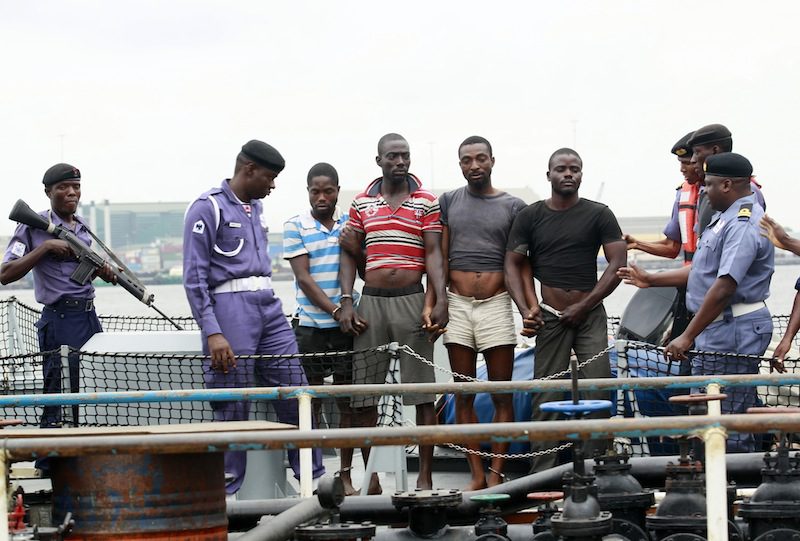Suspected pirates are paraded aboard a naval ship after their arrest by the Nigerian Navy at a defence jetty in Lagos August 20, 2013. REUTERS/Akintunde Akinleye
 By Tife Owolabi
By Tife Owolabi
YENAGOA, Nigeria, Dec 20 (Reuters) – Nigeria’s navy has installed eight automated, camera-equipped surveillance towers in the waters just off its coast, in an effort to tackle a surge in pirate attacks and crude oil theft that have blighted Africa’s top energy producer this year.
Chief of Naval Staff Vice Admiral Dele Ezeoba told journalists late on Thursday that the equipment, most of it from Japan’s Furuno and costing roughly $12 million in total, had high-frequency radio and long-range cameras able to spot ships up to 48 km (30 miles) away.
Pirate attacks off Nigeria have jumped by a third this year as ships passing through West Africa’s Gulf of Guinea, a major commodities route, have come under threat from gangs seeking to snatch cargoes or hold crews for ransom.
Oil theft in the Niger Delta has also seen a relentless rise, although analysts say this has only been possible because of collusion by the security forces.
The data the towers collect is beamed to a central naval intelligence room and then checked against ships’ registration, flag and other information, Ezeoba said in Yenagoa, in a part of the Niger Delta plagued by criminal gangs.
“From the domain awareness centre we can see ships from anywhere in the world coming or leaving our maritime space,” he said. “It also gives you ability to … ascertain the actual threat the vessel poses.”
Four are in Lagos, one each at the Bonny and Brass crude export terminals, one in Yenagoa and one in Ibaka, in eastern Akwa Ibom state.
But he added that Nigeria still needed to work on its capacity to pursue pirates and other criminal gangs.
Nigeria’s navy has had two successes against pirates this year – it captured four off the coast of the main commercial hub of Lagos in mid-August and said it killed 12 pirates in a shootout a week earlier.
But it has had little luck stemming this lucrative enterprise, which remains on the rise and has driven up insurance costs.
Unlike the waters off Somalia on the east African coast, where boats now have armed guards on board, there is scant protection for the many ships which anchor off West Africa. (Reporting by Tife Owolabi; Writing by Tim Cocks; Editing by Mark Trevelyan)
(c) 2013 Thomson Reuters, All Rights Reserved

 Join The Club
Join The Club











